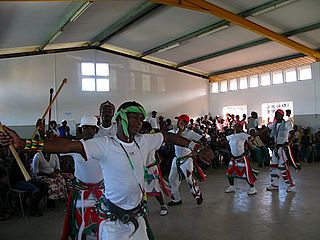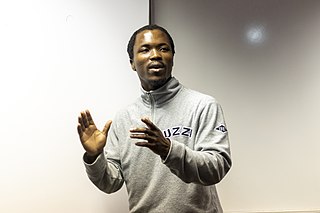Uses after 1994
Today, the high rate of protest in South Africa is often attributed to a "third force", [3] [4] [5] often assumed to be linked to foreign intelligence agencies, opposition political parties and white intellectuals. [6] [7]
However, S'bu Zikode of the shackdweller's movement Abahlali baseMjondolo has deconstructed the term by claiming the third force is the anger of the poor. [8] Abahlali baseMjondolo has also argued that "it is clear that the third force is just another name for the organised poor". [9]
The ANC also often refers to protestors and other critics as "counter-revolutionaries". [10] Cosatu President Sdumo Dlamini has claimed that popular organisations active in local politics are linked to the CIA. [11]
The Mail & Guardian has reported that: "According to grassroots activists the accusations of 'criminality' and 'third forces' are familiar: used to delegitimise and dismiss dissent and grievances - and perpetuate the notion of a society homogenously content with an ANC-led government." [12] The newspaper also quoted activist Ayanda Kota as saying that these allegations "take the agency away from us. It's the same argument used for the mineworkers fighting for a living wage: they are being used by some 'third force' . . .Poor people…apparently can't organize. It was the same with Steve Biko and the Black Consciousness Movement - the CIA were behind them." [12]
The xenophobic pogroms in May 2008 were also ascribed to 'the third force'. [13] In 2015 Malusi Gigaba also ascribed xenophobic violence to a "third force". [14] Protest at mining on communal lands, [15] independent trade union action, [16] student protest [17] and the formation of new political parties has also been seen in conspiratorial terms by the ANC. [18] Gwede Mantashe, secretary general of the ANC, has ascribed strikes on the mines to the agency of 'white foreigners'. [19] The ANC controlled eThekwini Municipality in Durban has repeatedly claimed that 'the third force' is behind land occupations in the city. [20] Charles van Onselen argues that the ANC uses the idea of 'the third force' as a conspiracy theory to deflect attention from its own failings. [17]
Amandla in the Nguni languages means "power". The word was a popular rallying cry in the days of resistance against apartheid, used by the African National Congress and its allies. The leader of a group would call out "Amandla!" and the crowd would respond with "Awethu" or "Ngawethu!", completing the South African version of the rallying cry "power to the people!". The word is still associated with struggles against oppression.
Cato Manor is a working-class area located 7 kilometres (4.3 mi) from the city centre of Durban, South Africa.

Abahlali baseMjondolo is a socialist shack dwellers' movement in South Africa which primarily campaigns for land, housing and dignity, to democratise society from below and against xenophobia.

Sibusiso Innocent Zikode is the current president of the South African shack dwellers' movement, which he co-founded with others in 2005. Abahlali baseMjondolo claims to have an audited paid up membership of over 115 000 across South Africa. His politics have been described as 'anti-capitalist'. According to the Mail & Guardian "Under his stewardship, ABM has made steady gains for housing rights."

Kennedy Road is an informal settlement in Durban (eThekwini), in the province of KwaZulu-Natal in South Africa. Formed in the late 1970s or early 1980s, the settlement was mentioned by the African National Congress (ANC) after the end of apartheid but amenities were not improved. The site is mostly not connected to sanitation or electricity. Dissatisfaction with local councillors led to 2005 protests including a road blockade, out of which the shack dwellers movemment Abahlali baseMjondolo (AbM) formed. In 2009, an AbM meeting was attacked resulting in two deaths and a court case. More recently, the municipality has improved facilities and promised to relocate inhabitants.

The Poor People's Alliance was network of radical grassroots movements in South Africa. It was formed in 2008 after the Action Alliance, formed in December 2006, was expanded to include two more organisations. It become defunct following the collapse of two of its affiliated movements, the Western Cape Anti-Eviction Campaign and the Landless People's Movement.
South Africa has been dubbed "the protest capital of the world", with one of the highest rates of public protests in the world.
Willies Mchunu was the 7th Premier of KwaZulu-Natal province in South Africa. He was previously a Member of the Executive Council (MEC) for the Department of Transport, Community Safety, and Liaison in the province. He is a member of the African National Congress and the former chairperson of the South African Communist Party (SACP) in KwaZulu-Natal and is a member of the Central Committee of the SACP. He is seen as a close ally of former South African President Jacob Zuma.

Zodwa Nsibande was the General Secretary of the Abahlali baseMjondolo youth league in 2009. She was critical of the impact of the FIFA 2010 World Cup on shack dwellers in Durban.
The attack on Kennedy Road in Durban, South Africa, occurred on 26 September 2009. A mob of men armed with bush knives, guns and bottles entered the Kennedy Road informal settlement searching for leaders of the shackdwellers movement Abahlali baseMjondolo (AbM). They looted shacks and threatened residents, before attacking a hall where a youth meeting was happening. Two people were killed and around a thousand were displaced. In the aftermath, AbM representatives such as S'bu Zikode went into hiding and thirteen AbM members were arrested.
Michael Sutcliffe is the former municipal manager of the eThekwini Metropolitan Municipality, which includes the city of Durban, South Africa. During his time in the position he was widely reported to be a controversial figure amongst Durbanites and was the target of popular protest in the city.
The Constitution of South Africa protects all basic political freedoms. However, there have been many incidents of political repression, dating back to at least 2002, as well as threats of future repression in violation of this constitution leading some analysts, civil society organisations and popular movements to conclude that there is a new climate of political repression or a decline in political tolerance.
There have been a number of political assassinations in post-apartheid South Africa. In 2013 it was reported that there had been more than 450 political assassinations in the province of KwaZulu-Natal since the end of apartheid in 1994. In July 2013 the Daily Maverick reported that there had been "59 political murders in the last five years". In August 2016 it was reported that there had been at least twenty political assassinations in the run up to the local government elections on the 3rd of August that year, most of them in KwaZulu-Natal.
In March 2013 around a thousand people occupied a piece of land in Cato Crest, Durban and named it Marikana after the Marikana miners' strike. Mayor James Nxumalo blamed the occupation on migrants from the Eastern Cape. He was strongly criticised for this by the shack dwellers' movement Abahlali baseMjondolo who said that "The City Hall is red with blood".
Nqobile Nzuza was a resident in the Marikana Land Occupation in Cato Crest, which is part of Cato Manor in Durban, South Africa. She was a member of the shackdwellers' movement Abahlali baseMjondolo.
Nkululeko Gwala originally from Inchanga in KwaZulu Natal, was a resident of Cato Crest, which is part of Cato Manor in Durban and a supporter of the Marikana Land Occupation (Durban). He was also a prominent member of the shackdwellers' social movement Abahlali baseMjondolo and chairperson of their Cato Crest Branch. He was assassinated on 26 June 2013.

The May 2008 South African riots was a wave of xenophobic riots starting in Alexandra, Gauteng on 12 May 2008 and then spreading to other locations across South Africa. The violence started when South African residents of Alexandra attacked migrants from Mozambique, Malawi and Zimbabwe, killing two people and injuring 40 others. Some attackers were reported to have been singing Jacob Zuma's campaign song Umshini Wami.

Ayanda Ngila (1992–2022), was a land activist, a prominent leader in the shack dweller's movement Abahlali baseMjondolo and deputy chairperson of its eKhenana Commune. He was assassinated on 8 March 2022.

The eKhenana Commune is a prominent land occupation in the historic working-class area of Cato Manor in Durban, South Africa. According to the Socio-Economic Rights Institute "The eKhenana settlement is organised as a cooperative in which residents collectively run a communal kitchen and tuck shop, theatre, poetry and music projects, and care for a subsistence vegetable garden named after the late Nkululeko Gwala [assassinated in 2013] as well as a poultry farm named in honour of the late S’fiso Ngcobo [assassinated in 2018]...The Commune is also home to a political school that residents named the Frantz Fanon School, as well as the Thuli Ndlovu Community Hall [Ndlovu was assassinated in 2014]. The Commune has suffered sustained political repression, including multiple arrests and three assassinations in 2022.

Lindokuhle Mnguni was a land activist and a prominent leader in the shack dwellers' movement Abahlali baseMjondolo. He was chairperson of the movement's youth league as well as the chairperson of the eKhenana Commune. He was a leader of eKhenana's food sovereignty project which sought to make the commune more self-sustaining and independent. He was assassinated on 8 August 2022.









